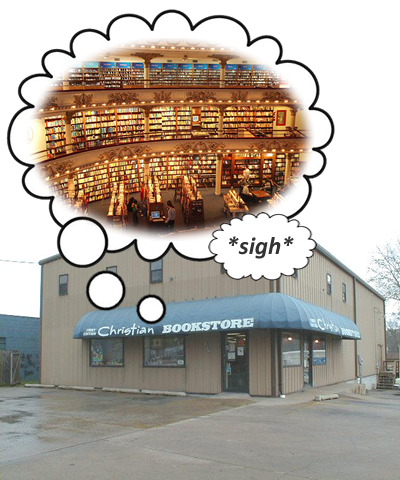‘Christian Fiction’ Vs. ‘Christians Writing Fiction’? We Need Both
A Christian-market agent just predicted the doom of Christian fiction. Sort of.
Agent Chip MacGregor of MacGregor Literary revealed predictions about 2017 publishing:
Christian fiction as we know it is going to almost completely go away.
He describes more: Christian fiction’s hardcore fanbase is aging, decreasing sales of their favorite genres, such as “Amish romance.” And other readers “have discovered there are quality issues with CBA mystery, suspense and thriller genres.” So here’s what’s next:
[Christian Booksellers Association] fiction is going to morph into “clean romance” and “values fiction” and “apocalyptic biblical thrillers” aimed specifically at a shrinking group of hard-core conservative evangelical readers in their 50’s. There are only a handful of houses still acquiring Christian fiction these days, and some of them are shifting to doing high-quality literary or women’s stories for a broader people of faith, or a slim list of suspense novels, rather than clearly religious stories aimed only at the faithful.
But don’t hold hope readers will switch to “New Adult, Fantasy, or Spec Fiction,” he says.
That’s where I come in. I’m not a publication professional but a semi-professional fan of fantasy. When I was a teen, I read Christian fiction. Now that I’m a grown-up, I still enjoy Christian fiction. And “secular” or general-market fiction. It’s not too much to ask for both.
This is my challenge whenever “young creatives,”1 as MacGregor says, debate whether Christians ought chiefly to enjoy (or write) “Christian fiction,” or “general-market fiction.”

Some say: “We need Christian fiction to give clean, wholesome alternatives to the world.”
Others insist: “No, we don’t more ‘Christian fiction.’ All that does is create a bubble. Instead we mainly need Christians-writing-fiction to avoid content limits and reach the real world.”
I question the divide itself. We need both Christian fiction and general-market fiction. For different reasons. But maybe not for the reasons fans and critics would believe.
Let’s explore quick definitions, then pros and cons for both “classifications” of story.
- When I say “Christian fiction,” I mean “stories made by Biblical Christians2 that explore biblical themes, usually made for other Biblical Christians to understand and enjoy.”
- When I say “general-market fiction” or “secular fiction,” I mean “stories made by anyone3 that explore simulations of people in reality, usually made for anyone to enjoy.”
1. Scripture supports Christians pursuing both kinds of stories.
Scripture is full of examples showing Christians doing two kinds of work in the world:
- Overt “ministry” work, such as pastoring and missionary-ing and teaching. This fulfills the Great Commission of making disciples in Jesus’s name.4 We join a kingdom of redeemed people whom Jesus will give a renewed creation forever.
- Subtler “ministry” work, such as creating and engineering and science. This fulfills God’s earlier commission to humans, the Cultural Mandate,5 to imitate His creative work in the world. We build the kingdom by reminding people what kinds of things God wanted us to do that glorify him forever, though today we’re limited by sin.
For Christian stories the divide is not exact. I would not always file “Christian fiction” under “Great Commission work” and “secular fiction” under “Cultural Mandate work.” A Christian could mix and match. But overall, Christian fiction ought to aid in the disciple-making Jesus encourages—not simply by repeating Gospel message basics or trying to get the reader saved, but by exploring reality as Jesus reveals it. And overall, Christians writing stories in the “secular” world ought to do much the same, though not for overt disciple-making.
To paraphrase the apostle Paul,6 therefore, the general-market Christian author cannot say to the Christian-market author, “I have no need of you.” And vice-versa.
2. Either kind of story has built-in content limits.
 We get it, yes: mainstream Christian fiction doesn’t allow swear words or sex scenes.
We get it, yes: mainstream Christian fiction doesn’t allow swear words or sex scenes.
And increasingly, mainstream secular fiction doesn’t allow in-depth Christian ideas.
So pick your poison. Both have limits. There is no such thing as a libertarian-free-will, content-limitless mass-media popular culture venue for Christian-made stories.
Sure, your usual CBA-friendly novel doesn’t give a flying fig for F-bombs. But in theory, you could pick up a Christian science fiction novel that naturally explores the concept of a sex dystopia, in which all social distinctions between men and women have been erased, until one handsome It, along with a beautiful Other-It, learn of this binary and lead a Revolution against the Government. You won’t find this novel in the CBA now, but someday you could.
So either genre you feel called to explore depends on your mission goals at that moment.
And in either genre, you will confront your own personal “content limits.” Christians can easily fool themselves into believing either their “wholesome alternative” stories or their outside-the-Christian-bubble stories actually help transform secular readers or viewers.
3. Both kinds of stories glorify God in the real world.
 What glorifies God more: words or music? Sermons or fellowship? Sunsets or prayer?
What glorifies God more: words or music? Sermons or fellowship? Sunsets or prayer?
Both of these glorify God in different ways. But depending on your needs or mission goals, you may need one or the other. You wouldn’t watch a sunset if a friend needs prayer. And if you’re hearing the Bible preached in a local church, it wouldn’t do to text with a friend.
And yet, whole books of the Bible—such as the Psalms—skillfully combined praise of God in both “earthly” means, such as art and nature, and “spiritual” means, such as the Law.
God doesn’t divide “the real world” into “church” and “reality.” He’s started the Church to help repair human souls in the real world. The Church exists for the world. But you can’t get to “saving the world” without going through the organized Church, subcultures and all.
Two mission fields
Occasionally at conferences, I meet authors who seem a bit defensive about their calling.
Maybe they think that if they say, “I like (or write) Christian stories,” you’ll assume they’re quaint and legalistic, naïve, possibly over-sheltered Precious Moments-collecting dweebs.
Or maybe they think that if they say, “I like (or write) stories in the general market,” you’ll assume they’re pagan, heretical, church-spurning compromisers who sell out the Gospel.
Neither set of assumptions is true. I say: Is it too much to ask for both?
If we learn to enjoy both, we may end up learning from each other. One way or another, together we are building the Kingdom of humans and stories that will last for eternity. And in God’s renewal of creation, all stories will be both Christian and “general market” stories.
- What is with this term? “Creative” is an adjective. Let’s keep it that way. Or else, use Tolkien’s term “subcreator” to ground the noun more firmly in the concept that human creativity reflects God’s. But “creatives” sounds pretentious and annoyingly “millennial.” ↩
- By Biblical Christians, I refer to a particular understanding of Gospel faith that has been common to orthodox Christian belief for nearly 2,000 years. These beliefs are drawn from Scripture and are often repeated in many confessions shared by thousands of denominations: for example, that all of reality is centered on the person and work of Jesus the God-Man, and human beings can only be saved from sin and death through His work for eternity. I follow a “must not contradict” approach to a professing Christian author’s stories that are called either “Christian fiction” or “Christians writing fiction.” That is, stories may not affirm every one of these beliefs. But they must not explicitly contradict this view of reality without subjecting to challenge the author’s professed faith. ↩
- The term anyone comes with its own qualifiers. A story is usually intended first for a particular group of people, sorted by language, fandom, genre, interest (or willingness) to participate in certain story content, or familiarity with source material or genre or series. Even “general market” fiction isn’t really intended for everyone. Some stories simply manage to reach out to more types of people than others. This is why I gently refute people who say things like “we don’t need more ‘Christian fiction,’ we just need more Christians writing fiction.” Nope. Evangelicals need not be the only people group in history to be denied their own subculture. ↩
- Matthew 28:16-20. ↩
- Genesis 1:28. ↩
- 1 Cor. 12:12-31 ↩





























Thanks for this. After years of supporting Christian fiction, I suddenly find myself having written a “general market” fantasy novel…
Agree whole-heartedly with this. We need both. In particular, we need both, assuming they both hold to high literary standards. I’m afraid this is where “Christian fiction” has fallen down often in the past, and it’s one of the reasons why I’m not a big fan of Christian fiction. Not because I object to the genre or the intent (why can’t Christians have stories that explore topics and themes specifically relevant to them?) but because too many of them are not not well written. And yes, that can be true of secular market fiction as well, but it bugs me more with Christian fiction, it seems. I guess because Christian art in general used to be the best. Now too often it settles for being derivative and kitschy.
I would second this. The impression I get from many writers in contemporary Christian fiction is that they start from the premise of “God gave me this story” and use it as an excuse to circumvent many essential steps in the writing process. The result is usually a cliched plot, predictable characters, excessive fast-paced events and a tone of almost weepy sentimentality. There are exceptions, of course, particularly with “stars” such as Frank Peretti and Ted Dekker (though the sentimentality is still strong with the latter), but it seems that quality is becoming more and more of an issue with the rise of self-publishing (not that I have anything against self-published authors – I speak as one myself).
For these reasons, I’m also more drawn to the general market (both in my choice of reading material and in my own writing). In my view, we need a lot more Christian authors today writing in the vein of Tolkien and Dostoevsky, both of home imbued their works with their own most deeply held values and beliefs even though they did not consciously write for a “Christian Fiction” market (in their time it did not yet exist). The Christian fiction market itself could be improved by more writers emulating classical precursors like John Milton – not by producing exact duplicates of “Paradise Lost” but by undertaking works of similar scope and complexity.